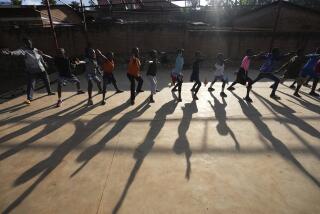U.N. Panel Vows Justice in Rwanda : Africa: Commission has only three members but will probe genocide of half a million people. Report is pledged by month’s end.
- Share via
KIGALI, Rwanda — At present, they are just a handful--three jurists and four investigators. Yet members of a U.N. commission sent here to probe the swiftest genocide of modern times vowed Friday to identify those responsible so they can face trial.
“It’s not solely for the sake of justice,” said Atsu-Koffi Amega, a former foreign minister of Togo who was named president of the U.N. commission.
“Time is pressing,” Amega said. “We must not allow time for vengeance, for private justice, for reprisals.”
To do that would give another powerful twist to the tragic spiral of ethnic murder and hatred that has afflicted this small mountainous land in Central Africa for 3 1/2 decades. It would also abort the fragile steps now under way toward reconciliation.
An ethnic blood bath drenched Rwanda last spring. As many as half a million people, and perhaps many more, were slaughtered. The massacres are regarded by many as the most abject failure to date of the international community to enforce worldwide standards of civil conduct and human safety.
The U.N. Security Council, by establishing a three-member panel in July to investigate charges that Rwanda’s former Hutu government orchestrated a campaign to wipe out the Tutsi minority, took a first if modest step toward bringing those responsible for the mass murders to account. “Let justice be done,” Amega told a news conference.
He and the other two African jurists who sit on the commission arrived in Rwanda’s capital Monday. By the end of the month, Amega pledged, his panel will have sent an interim report to U.N. Secretary General Boutros Boutros-Ghali. A full report to the Security Council is due by November’s end.
In April, guided by government troops, gangs of young thugs with clubs, machetes and spears rampaged through this city sprawled across the back of pleasant green hills, hunting members of the ethnic group that until the 1950s had ruled the Hutus as feudal overlords for centuries.
The explosion of violence was triggered by the deaths of President Juvenal Habyarimana and the leader of neighboring Burundi, Cyprian Ntayamira--both Hutus--in a plane crash. The feared Interahamwe militia, the armed youth wing of the late president’s party, is blamed for much of the killing.
“We are going to determine responsibility, one by one,” pledged Haby Dieng, a lawyer from Guinea.
Just as important, commission members said, they will recommend what sort of tribunal should put the killers on trial--a Rwandan court or a panel like the one that judged Nazi war criminals at Nuremberg.
If a super-national court were established, it would be a milestone in the protection of human rights since the U.N. Convention outlawing genocide was passed by the General Assembly in 1948. An international court has never assembled to put on trial those accused of violating the Convention, experts said.
A lack of precedent and the grindingly slow progress in a similarly mandated U.N. effort to identify war criminals in the Balkans make many doubt that the international community can take speedier or more effective action in Rwanda.
Skeptics include the leaders of the Rwandan Patriotic Front, which ousted the Hutu-dominated government in July and now holds power. Rwandan President Pasteur Bizimungu and Prime Minister Faustin Twagirimungu have complained that to allow foreign governments or the United Nations to control the tribunal would likely lead to unacceptably long delays. They have insisted that genocide trials be convened as soon as possible against Hutu officials who planned, ordered or carried out the massacres.
At the same time, members of Rwanda’s government were said last month to have offered assurances that an international tribunal would receive jurisdiction over any genocide investigations rather than leaving it to the Tutsi leaders to determine justice.
A division of labor may be the solution proposed by the U.N. commission of African jurists. Its third member, Salifoul Fomba of Mali, said members of the former Rwandan government and other ringleaders could be put on trial by an international court, while “small fry” would be left to Rwandan judges.
Amega conceded there is a danger of the legal process being exploited here by the now-triumphant Tutsis to avenge their countrymen.
“To allow a Rwandan court to try the genocide cases would make them (Tutsis) both judge and victim,” he said.
Bled by massacres and civil war, Rwanda may simply not be able to organize proper trials.
Marthe Mukamurenzi of Rwanda’s Justice Ministry said Friday, for example, that she knew of only three Rwandan lawyers still alive.
Further, just bringing killers into court would also be problematic. Leaders of the ousted government and their followers have fled Rwanda en masse for Zaire, Tanzania and other nearby countries.
And despite their pledges and encouraging talk, members of the U.N. commission were forced to acknowledge that they have only four investigators in this country, which is roughly as large as Maryland.
“Don’t laugh. It’s very serious,” Amega upbraided journalists who reacted to his revelation about his scant staff.
He said he has asked other countries to provide 200 forensic medical experts and legal investigators to help in the probe of genocide and human rights violations. He said Friday that he expects many of them to be at work in two weeks.
When the three jurists’ work is finished here, the Security Council will be free to accept or reject its recommendations. Even if it accepts them, setting up a tribunal and prosecutions could consume much time.
More to Read
Sign up for Essential California
The most important California stories and recommendations in your inbox every morning.
You may occasionally receive promotional content from the Los Angeles Times.













